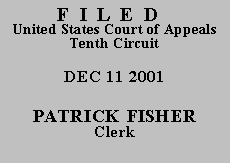

|
IVORY GIBSON, JR.,
v.
L. E. FLEMING |
|
Before HENRY, BRISCOE, and MURPHY, Circuit Judges.
Ivory Gibson, a federal prisoner proceeding pro se, appeals the district court's denial of his 28 U.S.C. § 2241 petition; he also seeks permission to proceed on appeal in forma pauperis. Because this court concludes that the district court lacked jurisdiction over Gibson's petition, we vacate the district court's order and remand to the district court to dismiss the petition without prejudice.(1)
The sole ground for relief set forth in Gibson's § 2241 petition is the contention that his 18 U.S.C. § 924(c) conviction is invalid under the Supreme Court's decision in Bailey v. United States, 516 U.S. 137 (1995). After Gibson's petition was referred to a magistrate judge for initial proceedings pursuant to 28 U.S.C. § 636(b)(1)(B), the magistrate judge recommended that the petition be denied. The magistrate judge began by noting that a 28 U.S.C. § 2255 motion is the sole avenue for challenging the validity of a federal criminal judgment and sentence unless the § 2255 motion is inadequate or ineffective to test the legality of the federal inmate's detention. See Bradshaw v. Story, 86 F.3d 164, 166 (10th Cir. 1996). A § 2241 petition, on the other hand, attacks the execution of a sentence rather than its validity. See id. It is not "an additional, alternative, or supplemental remedy to § 2255." Id.
With this background in mind, the magistrate judge rejected Gibson's contention that he should be able to bring his Bailey claim under § 2241 because § 2255 is inadequate. While recognizing that three Circuits had allowed petitioners to raise Bailey claims in § 2241 petitions, the district court noted that in each of those cases the petitioner had exhausted his direct appeal and collateral proceedings prior to the decision in Bailey. See In re Davenport, 147 F.3d 605, 611-12 (7th Cir. 1998); Triestman v. United States, 124 F.3d 361, 373 (2d Cir. 1997); In re Dorsainvil, 119 F.3d 245, 251-52 (3d Cir. 1997). In Gibson's case, however, Bailey had been decided in time for Gibson to raise it in a timely § 2255 motion. In fact, although he did not file a timely § 2255 motion, Gibson did raise this exact Bailey claim in a § 2255 motion filed outside of the time limits set out in 28 U.S.C. § 2244. The United States District Court for the Northern District of Texas dismissed that motion on the ground that it was time-barred. Although Gibson filed a notice of appeal from the dismissal of his § 2255 motion, the appeal was eventually dismissed by the Fifth Circuit on the basis of Gibson's failure to prosecute the appeal.
Because Gibson could have raised his Bailey claim in a timely § 2255 motion had he diligently pursued his remedies and because Gibson had in fact raised the claim in a previous § 2255 motion filed in the Fifth Circuit, the magistrate judge concluded that § 2255 was not inadequate to test the validity of Gibson's conviction. See Caravalho v. Pugh, 177 F.3d 1177, 1178 (10th Cir. 1999) (holding that § 2255's substantive and procedural barriers do not render § 2255 inadequate or ineffective). Accordingly, the magistrate judge concluded that Gibson could not raise his claim in a § 2241 petition and recommended that the district court deny the petition. Upon de novo review, the district court adopted the magistrate judge's report and recommendation and denied the petition.
This court has conducted a de novo review of Gibson's appellate filings, the magistrate judge's report and recommendation, the district court's order, and the entire record. That review demonstrates that the district court was clearly correct in determining that a § 2255 motion is the exclusive avenue for Gibson to raise his Bailey claim and in determining that the remedy afforded under § 2255 is not inadequate or ineffective. Having so determined, however, the district court should have dismissed the petition without prejudice on the ground that it lacked jurisdiction to consider Gibson's claims. See Bradshaw, 86 F.3d at 166-67 (holding that a § 2255 motion must be brought in the district that imposed the sentence and approving district court's dismissal of improper § 2241 petition without prejudice so that petitioner could proceed under § 2255 in district of conviction). Accordingly, this court VACATES the district court's order denying Gibson's petition and REMANDS the case to the district court to dismiss the petition without prejudice. Gibson's request to proceed on appeal in forma pauperis is GRANTED.
ENTERED FOR THE COURT
Michael R. Murphy
Circuit Judge
*. This order and judgment is not binding precedent, except under the doctrines of law of the case, res judicata and collateral estoppel. The court generally disfavors the citation of orders and judgments; nevertheless, an order and judgment may be cited under the terms and conditions of 10th Cir. R. 36.3.
1.Because Gibson is a federal prisoner, he does not need a certificate of appealability to appeal the district court's denial of his § 2241 petition. See Montez v. McKinna, 208 F.3d 862, 867 (10th Cir. 2000).